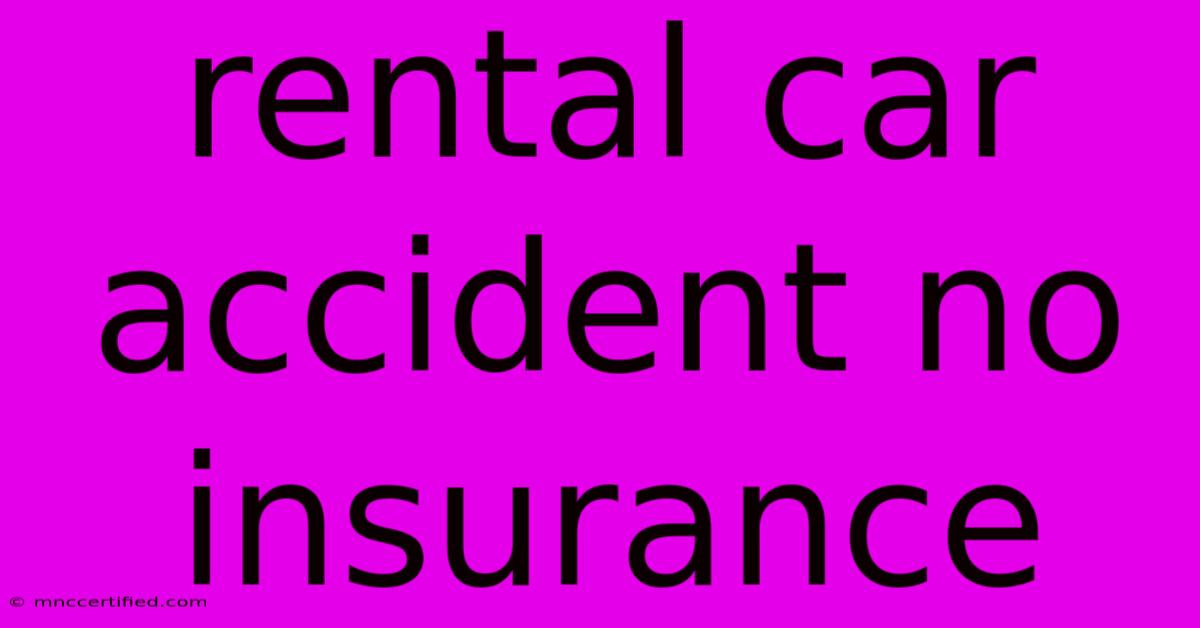Rental Car Accident No Insurance

Table of Contents
Rental Car Accident: What to Do When You Have No Insurance
Finding yourself in a rental car accident is stressful enough, but the situation becomes significantly worse if you don't have the proper insurance coverage. This guide provides crucial steps to take and explains the potential consequences of driving a rental car without insurance.
Immediate Actions After a Rental Car Accident (No Insurance)
1. Ensure Safety: Your first priority is the safety of yourself and others involved. Check for injuries and call emergency services (911) if needed. Even minor accidents should be documented.
2. Gather Information: Before moving vehicles, if possible, collect crucial information from all parties involved. This includes:
- Names and contact details: Get the names, phone numbers, addresses, and email addresses of all drivers and passengers involved.
- Insurance information: Obtain the insurance company name, policy number, and claim number of all other drivers involved.
- Vehicle information: Note down the make, model, year, and license plate numbers of all vehicles involved.
- Police report: If the police are called, obtain a copy of the accident report. This is a vital piece of evidence.
- Photos and videos: Document the accident scene thoroughly with photos and videos, capturing damage to all vehicles, the surrounding area, and any visible injuries.
3. Contact the Rental Car Company: Report the accident to the rental car company immediately, regardless of fault. Delaying this notification could negatively impact your situation.
4. Seek Medical Attention: Even if you feel fine, seek medical attention. Hidden injuries can manifest later, and having medical documentation is crucial for any potential claim or legal action.
Understanding the Consequences of Driving Without Insurance
Driving a rental car without insurance exposes you to significant risks:
- Financial Ruin: If you're at fault, you'll be personally liable for all damages, medical bills, and legal fees associated with the accident. This can lead to substantial debt.
- Legal Issues: Depending on the severity of the accident and local laws, you could face legal penalties, including fines, license suspension, or even criminal charges.
- Damage to Credit Score: Unpaid medical bills and legal judgments can significantly damage your credit score, making it difficult to obtain loans, rent an apartment, or even get a job.
- Towing and Storage Fees: You'll be responsible for the cost of towing and storing the damaged rental car.
What to Do After the Immediate Aftermath
1. Review your Rental Agreement: Carefully examine the rental agreement to understand the terms and conditions, especially regarding insurance.
2. Contact a Lawyer: Consulting with a personal injury lawyer is highly recommended. They can advise you on your legal rights and responsibilities and represent you in any legal proceedings.
3. Explore Potential Options: While you didn't have insurance at the time of the accident, explore potential options to cover the damages. This may include:
- Uninsured/Underinsured Motorist Coverage: Check if you have this coverage on your personal auto insurance policy. It might cover damages caused by an uninsured driver.
- Credit Cards: Some credit cards offer rental car insurance as a benefit. Review your card terms and conditions.
- Personal Savings: Unfortunately, in many cases, you may need to rely on personal savings to cover the costs.
Preventing Future Accidents: The Importance of Insurance
Always secure adequate insurance coverage when renting a car. This includes:
- Collision Damage Waiver (CDW): This protects you from financial responsibility for damage to the rental car.
- Liability Insurance: This covers damages and injuries you cause to others.
- Personal Accident Insurance (PAI): This can cover medical expenses for you and your passengers.
Driving without insurance is a gamble with potentially devastating consequences. Prioritize your safety and financial well-being by ensuring adequate insurance coverage whenever you rent a vehicle. This article is for informational purposes only and does not constitute legal advice. Always consult with the appropriate professionals for guidance on your specific situation.

Thank you for visiting our website wich cover about Rental Car Accident No Insurance. We hope the information provided has been useful to you. Feel free to contact us if you have any questions or need further assistance. See you next time and dont miss to bookmark.
Featured Posts
-
Clinton Reflects On Oslo With Crystal
Nov 21, 2024
-
Mitchell Prop Bets Cavs Vs Pelicans
Nov 21, 2024
-
I Dont Know Today Show Host
Nov 21, 2024
-
Farm Bureau Commercial Insurance
Nov 21, 2024
-
How Much Is A Gram Of Zinc Worth
Nov 21, 2024